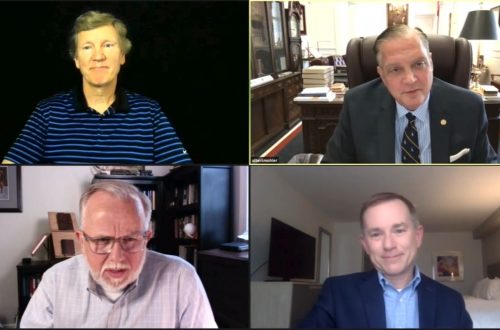I have been preaching expositionally through the Gospel of John at our church, and a couple weeks ago I came to John 3:29, which says this:
The one who has the bride is the bridegroom. The friend of the bridegroom, who stands and hears him, rejoices greatly at the bridegroom’s voice. Therefore this joy of mine is now complete.
My explanation on this point relied almost entirely on something that I read in Colin Kruse’s commentary on this text. Here’s is the relevant excerpt from my sermon manuscript:
The analogy is really simple here. At a wedding, you have a bride, a groom, and a best man. The best man is just a friend of the groom. He is not supposed to be hitting on the bride. On the contrary, in first century Jewish marriage customs, the best man…
“…was responsible for leading the bridegroom to his bride and then waited outside the bridal chamber while the marriage was consummated. The mention of the bridegroom’s voice, some suggest, refers to the shout of exultation by the bridegroom when he discovered he had married a virgin” (Kruse, 131-32).
John knows the role God has given him according to God’s sovereign will. God calls him to be the friend of the groom, not the groom. As such, John intends to rejoice as Jesus begins to draw more followers than John the Baptist.
Some readers will recognize that Kruse is reading John 3:29 in light of Jewish marriage customs that rose up in response to texts like Deuteronomy 22:13-17, which speaks of a brides’s “evidence of virginity” discovered by her husband on her wedding night. In Kruse’s retelling, there was a custom of the best man waiting outside the bridal chamber for the husband’s verbal confirmation of the bride’s virginity. The best man would then rejoice at the voice of the groom, who confirms that the best man had delivered to him a pure bride. In the analogy, therefore, John the Baptist would be rejoicing at the voice of Jesus confirming that John had in fact delivered to him a repentant people of God. (Remember that John prepared the way for Jesus by preaching a baptism of repentance, e.g., Mark 1:4; Luke 3:3).
This was a small part of my sermon, and the point that I was making doesn’t stand or fall on this particular observation from Kruse. Nevertheless, I got asked about it during a “sermon and service review” with my fellow elders. Also, my pastoral interns raised questions about this particular part of the sermon. On the Monday after I preached it, I listened to John Piper’s exposition of the text from 2009 which raised questions in my own mind about Kruse’s interpretation.
Kruse offers a coherent explanation that seems pretty compelling on its face. But over the last couple weeks, I have become unconvinced of Kruse’s explanation. Here’s why.
1. Since preaching the sermon, I decided to do a deep dive on the source of Kruse’s suggestion that the best man would wait outside the bridal chamber for the husband’s confirmation of virginity. Kruse relies on comments from Joachin Jeremias in The Theological Dictionary of the New Testament. Jeremias says this:
Hence the [the voice of the bridegroom] of Jn. 3:29 is probably the call of the bridegroom from the bridal chamber for the friend who customarily fetches the signum virginitatis [“Numphe, Numphios,” TDNT].
The signum virginitatis is the “evidence of virginity” referred to in Deuteronomy 22:13-17. Where is Jeremias finding evidence of this custom? Jeremias does not cite a primary source for this custom but rather Adolf Schlatter’s 1930 commentary on the Gospel of John. Schlatter’s commentary is in German, but here’s a rough translation:
In the image used here, the friend’s standing is of course not meaningless. Standing in front of the bridal chamber, he waits for the bridegroom’s jubilant call… The opposite behavior of a friend of the bridegroom was told in the Samson story, Judg. 14, 20 [Schlatter, Der Evangelist Johannes, p. 108].
Schlatter’s observation is not based on a primary source indicating that such was a custom. Rather, it seems to be his own extrapolation of what is going on in John 3:29 in light of Deuteronomy 22:13-17. The bottom line is that this particular point about first century wedding customs is not supported by any hard evidence. If there is evidence for this particular practice somewhere in first century rabbinic Judaism, neither Kruse nor Jeremias nor Schlatter show it to us.
This is a good lesson in the use of historical backgrounds. If you use them, make sure they are well-sourced. Also, make sure that they are hermeneutically relevant. And that brings me to my second point.
2. Even if a particular historical observation is well-sourced, that doesn’t mean that it’s relevant to the interpretation of a given text. In this case, even if there had been a stronger case for this particular custom, I don’t think it would have been relevant to the interpretation of John 3:29. And that’s where John Piper’s exposition of the text probably helped me the most in all of this. In fact, I think Piper sees this text more clearly than any of the other commentators that I read.
Rather than turning to some obscure point from historical backgrounds, Piper appeals directly to the usage of the term “voice” within the Biblical text. In my view, this is a much more fruitful way to interpret “the voice of the bridegroom.” Piper explains:
He totally surprises us with a new image in verse 29. “The one who has the bride is the bridegroom. The friend of the bridegroom, who stands and hears him, rejoices greatly at the bridegroom’s voice. Therefore this joy of mine is now complete.”
Why the mention of the bridegroom’s voice? Why does the friend of the bridegroom — John the Baptist — rejoice greatly over the bridegroom’s voice? Perhaps only because his voice means he is here. And the friend is glad he’s here. But I suspect it’s more than that. John the Baptist described himself in John 1:23 as “the voice” crying in the wilderness. His own voice has gathered a people. But now they are all leaving and going to Jesus. Why? Because another voice is being heard. A greater voice. A stronger voice. “The sheep hear his voice, and he calls his own sheep by name and leads them out. . . . The sheep follow him, for they know his voice” (John 10:3–4).
The bridegroom has the bride because the bride has a voice, and the bride knows the voice of her husband. And she leaves John and goes to him. John rejoices in the voice of the bridegroom, not just because the bridegroom is here, but because the voice gathers the bride — and it gathers her precisely away from John. Which is why the next words out of his mouth in verse 30 are, “He must increase, but I must decrease.” It must be so. And in this, I rejoice.
We are in deep waters here. John the Baptist’s identity was bound up in being the “voice” of one crying in the wilderness. And yet, when Jesus appears, John doesn’t rejoice in his own identity as the voice. On the contrary, he rejoices in “the voice of the bridegroom.” He rejoices that Jesus is on scene to carry away his bride. What John says is beautiful and true and good and right and glorious. It is the point of the passage, and it’s why John says, “He must increase, but I must decrease” (John 3:30).
You can listen to my sermon on this text here if you are interested, but I highly recommend listening to Piper’s sermon on the same text. It is so insightful and powerful.
P. S. After I had nearly finished writing this post, I discovered that John Piper wrote a blog post after delivering his sermon on this text (like I’m doing right now). In that blog post, he credits someone else for giving him more insight into the text after he had already preached it (like I’m doing now). What a smiling providential coincidence. We are all learning, aren’t we? “As iron sharpens iron, so one man sharpens another” (Prov. 27:17).






